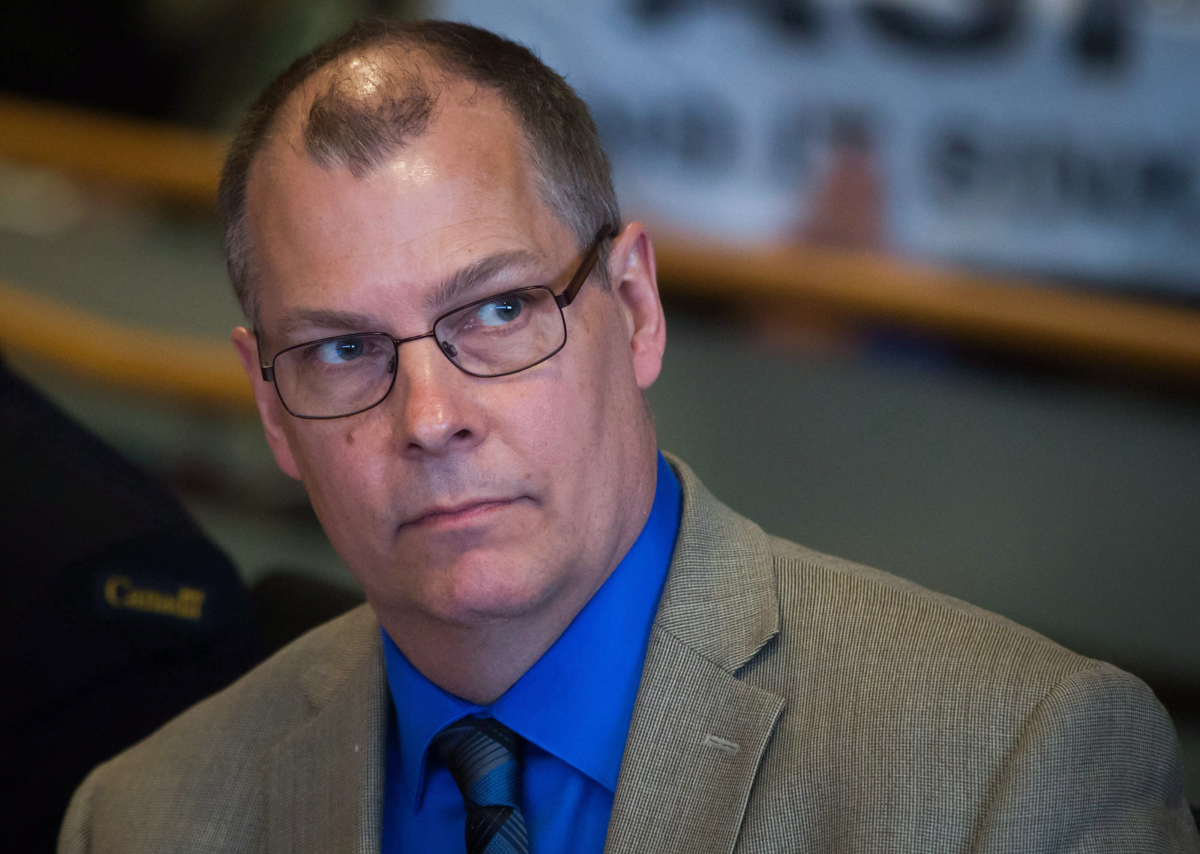Support strong Canadian climate journalism for 2025
Brenda Kenny has a tall order to fill.
In the coming weeks, the former bureaucrat and industry insider will be part of a five-member team leading a review of Canada’s embattled energy regulator, the National Energy Board.
The NEB is several decades old and most Canadians have probably not heard much about it — at least not until some recent acrimonious debates across the country about the expansion of fossil fuels, pipelines and Canada’s climate change goals.
But this national regulator plays a critical role related to public safety, the environment, and the Canadian economy.
The NEB was created to regulate pipelines and electric transmission lines that cross provincial and international boundaries. It was initially based in Ottawa, but the Progressive Conservative government of former prime minister Brian Mulroney moved the agency's headquarters to Calgary in 1991.
The regulator's mandate includes overseeing safety issues on the federally-regulated energy infrastructure as well as monitoring the tolls charged by the pipeline operators. It also includes analysis of national energy trends for the government.
The review will examine the NEB's structure, role and mandate.
Embroiled in controversy
Decades since its creation, the NEB is today embroiled in controversy following a series of conflict-of-interest scandals related to its reviews of major projects proposed by such companies as Calgary-based TransCanada Corp. and Texas-based Kinder Morgan. Critics say that the regulator is too cozy with industry stakeholders and puts their interests ahead of its mandate to protect the public from an environmental disaster.
The Liberal government of Prime Minister Justin Trudeau was elected following a 2015 campaign in which it pledged to restore public confidence in federal oversight of industry. To deliver on that promise, Kenny was appointed with four other experts — co-chairs Hélène Lauzon and Gary Merasty, David Besner and Wendy Grant John — to lead the review of the regulator.
“The NEB Act has been in place since 1959,” Kenny said in a recent interview with National Observer. “Some people would think that’s a long time without a major overhaul.”
Survey shows NEB employees don't trust management
In recent surveys, NEB employees have also expressed concerns about the culture and behaviour of senior management and whether it is following its own rules.
Some of the unusual happenings include the mysterious deletion of an email, sent in the middle of the night to the NEB's head of security. There were also internal grumblings regarding a decision by senior management to spend about $1 million on new furniture after spending roughly $20 million on a cross-town move to new headquarters in Calgary in 2014.
In May 2015, the Board's chief operating officer, Josée Touchette, sent a message to all staff defending her fellow executives after some particularly dismal survey results revealed that only 34 per cent of NEB employees said they understood the rationale behind management decisions and directions. The message was obtained by National Observer using access to information legislation.
“I would like to assure you that the message is received!" Touchette wrote in the message sent on May 8 of that year. "I am committed to ramping up my internal communications to better explain the rationale behind some of the activities that are taking place. We have planned upcoming messages to respond to comments in the survey about topics you would like to see more information about.”
The NEB's president and chief executive Peter Watson declined a request from National Observer to be interviewed for this article. He has made very few public comments since September when he was forced to recuse himself from a major review of TransCanada's Energy East pipeline, because of revelations by National Observer that he had met behind closed doors with a paid company consultant, former Quebec premier Jean Charest.
A few weeks after the recusal, Watson told a Senate committee in Calgary that the NEB needed to "get better" at meeting, listening and talking to Canadians.
"I want to be clear that the events from Energy East and Eastern Mainline must not deter us from our vitally important engagement work with citizens and communities across the country," Watson said in Calgary. "Building public trust has been, and continues to be, my core focus at the NEB. As such, we have committed to an ambitious transformation agenda within our existing legislative framework to make us better and to align our resources to our priorities.
"The government's modernization review also provides an excellent opportunity to engage Canadians on the NEB's role and mandate."

For her part, Kenny carefully avoided commenting directly on policy questions during the interview.
However, she clearly knows the NEB inside out, having served as an executive at the regulator and later as president and CEO of an industry lobby group, the Canadian Energy Pipeline Association, for seven years until 2016. Kenny also has a background in environmental studies and was recently appointed as a co-chair of "Women for Nature" by Nature Canada, a conservation group.
Kenny's appointment initially drew criticism from New Democratic arty leader Tom Mulcair who accused the Liberal government of putting "industry hacks" in charge of the review. But Kenny has also been praised, throughout her career, for demonstrating pragmatism and rising to high levels in government and industry in a sector that is traditionally dominated by men.
The other members of the panel include Lauzon, who chairs the Quebec Business Council on the Environment; Merasty, president and COO of Des Nedhe Developments and a member of the Peter Ballantyne Cree Nation; Besner, president of the New Brunswick Energy Institute; and Wendy Grant John, who served three terms as Chief of the Musqueam First Nation and was the first woman elected as a regional chief of the Assembly of First Nations.
Rebuilding the NEB from scratch?
Natural Resources Minister Jim Carr has said that having better regional representation across Canada and stronger input from indigenous Canadians is one of the priorities for the modernization of the NEB. But he has already suggested that the overhaul could go much further.
There have been musings about stripping the NEB of some of its existing powers in the wake of the Energy East fiasco, according to a report last October by Reuters. And Carr told a parliamentary committee in the spring of 2016 that the government was trying to figure out how to build a new regulator “from scratch” as part of its consultations with Canadians and elected politicians.
“We will be posing the question: ‘If you had to create a Canadian regulator from scratch, what would it look like? What would the principles be that would determine the structure? What would the legislation that we would ask Parliament to pass consist of? What would the values be? And what is the relationship ultimately between the government and the regulator?’ So that is the longer term reform of the NEB,” Carr said.
Still, the review has left some critics scratching their heads because the government is proceeding with some major decisions on industrial projects before it has fixed the oversight problems.
Some environmentalists and young voters have said they helped elect Trudeau’s government, but now feel betrayed that he has approved projects such as Kinder Morgan’s Trans Mountain expansion, without requiring a new review with stronger rules in place to protect the environment.
Conservatives want to loosen regulatory oversight
On the other hand, some industry supporters and federal Conservatives have criticized the Trudeau government for being too cautious about energy development, and they've suggested that Canada needs to further loosen its oversight, beyond major changes brought in by the former Harper government.
Kenny said she and other members of the panel have met with senior staff at the NEB, including chief executive Peter Watson, as well as staff from the federal Natural Resources Department. The panel members want to make sure that everything they do will be public and engage Canadians to learn more about their energy regulator, she explained.
“It’s important for all Canadians to take a look at the history of the NEB and the types of tools and laws that are in place right now,” she said. “The breadth of their safety mandate on the full life cycle is significant and is something that many people may not be aware of.”
She added that the ultimate solutions are not only going to be about what works in 2017, but also what works in 2037 and beyond.
The panel has until March 31 to submit its final report to the government.






Comments
What better person than an industry and NEB insider like Kenny, to perpetuate/retain the apparent symbiotic and cozy, deviant corporate culture between them?
It's hardly "starting from scratch", when industry and the NEB share at least one plant on the inside of this panel.
Some "modernization".
The more things change, the more they remain the same.
Why is it that at least one of the government appointees to the panel in charge or investigating the NEB has such a deep background as an employee of the NEB and, as well, as a lobbyist for the industry? This reminds me of the scandal that plagued the government over their appointed chairwoman of the trio who were appointed to seek more public input on the Kinder Morgan project after the NEB recommended the project. No wonder the NEB is a completely discredited agency in the eyes of the electorate! Here we have a mirror image situation developing again! Trudeau, by now, shouldn't be making the same appointment errors unless he's asking for his entire government to be discredited. Looks to me though that he seems determined to continue in that direction. A few informal coffee house chats aint goin to fix the mess he's already made by OKing Kinder Morgan before he does anything about the NEB! He's really got the cart before the horse.
So let us see: the chair of the committee to review the NEB used to be an executive there, during the time the NEB was in bed with the industry. And she used to work for the industry as a lobbyist. That makes perfect sense. Having been an executive at the NEB and participated in the cozy relationship with oil and gas executives she gets hired by the industry to lobby on its behalf. She would be perfect for them. In her industry lobby role, she used her contacts at the NEB and other government agencies to push for more pipelines. Now, Trudeau puts her in charge of the NEB review. Quite the talent, Mz Kenny has--moving so easily between the regulator and the industry. This is not confusing if we understand the policy of the Trudeau government and the policy of the oil and gas industry are the same: more carbon extraction and transportation. We should also understand that the government's role is to sell the extraction and transportation to a skeptical public increasingly worried about climate change and the obvious corporate takeover of the halls of government.
A preordained mission perhaps. In December of 2015, Kenny was already certain the NEB was just fine. One can imagine, she intends to use her extensive lobbying skills and industry bias to convince Canadians more of the same.
"Kenny said the NEB is already serving Canadians well."
“The extreme volume of information that is cross-examined and tested, and looking at any major project, is unbelievable,” she said. “There is more environmental study, engineering study, transparency, and evaluation now than in any point of our history. And the outcome of it is a system of energy that moves anything outside of wires, every day, seamlessly with an extraordinary safety record.”
http://business.financialpost.com/news/energy/making-a-case-for-pipelin…